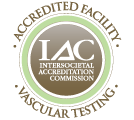Varicose Vein Ablation (Closure) Explained
Basic Facts
Vein ablation is a minimally invasive technique that destroys varicose leg veins.
The treatment sends bursts of radiofrequency or laser energy through a catheter; the resulting heat intentionally destroys vein wall tissues along the length of the vein.
Vein ablation relieves symptoms associated with painful varicose veins, improves appearance of the legs, and has a low risk of side effects.
Varicose veins occur when weak veins near the surface of the leg stretch, bulge and twist. Varicose veins can be visible through the skin.
Left untreated, varicose veins can cause:
• Fatigue
• Aches
• Swollen ankles
• Scaly , dry skin
• Leg sores/wounds
When Is It Varicose Vein Ablation Indicated ?
Varicose vein ablation may be indicated in patients who:
• Have chronic venous insufficiency
• Suffer from skin problems on the legs
• Wish to improve the appearance of varicose veins
If varicose vein ablation is used cosmetically, it may not be covered by health insurance.
PRETREATMENT GUIDELINES
First, the physician examines the legs using duplex ultrasound to decide whether varicose vein ablation is appropriate and is likely to improve symptoms.
The patient does not need to do any special preparation for this procedure.
WHO IS ELIGIBLE?
Healthy patients with varicose veins are eligible for varicose vein ablation.
Pregnant women who want to treat varicose veins should wait 8 weeks after giving birth before scheduling therapy, because pregnancy induced varicose veins may fade.
WHAT TO EXPECT
Varicose veins ablation is preformed as an outpatient procedure under local anesthesia. Immediately before the procedure, the physician will perform duplex ultrasound to map the leg veins.
Although the techniques for ablation and laser ablation vary slightly, both treatments destroy tissue with heat. Radiofrequency energy comes from electric and magnetic energy and laser comes from light.
The physician passes a catheter (long thin tube) through a small nick in the skin above the vein and moves the catheter to the end of the vein. The physician activates a radiofrequency generator or sends laser pulses through the catheter as he or she slowly retracts the catheter. The heat destroys the tissue along the length of the vein. The vein collapses and is eventually reabsorbed by the body.
Occasionally, the patient may experience brief pain if the radiofrequency catheter or laser heats tissue near a nerve. This pain disappears once the physician moves the catheter. Oral valium is offered as long as the patient has a driver to help with any anxiety the patient may have regarding the procedure.
The procedure takes 30 minutes and may relieve symptoms immediately.
POST-PROCEDURE CARE
Patients can resume normal activities immediately after the procedure but should avoid strenuous activities such as lifting more than 10lbs for 1 week.
You will be wearing compression stockings for 2-6 weeks as instructed by your physician.
POSSIBLE COMPLICATIONS
Minor bruising, redness, tenderness and soreness.
In theory, any procedure that destroys vein tissue can trigger a deep vein thrombosis (DVT) in patients who are susceptible. Please report any serious pain, extreme redness, shiny skin and swelling.
LIFESTYLE ADJUSTMENTS
The following lifestyle changes help prevent varicose veins:
• Avoid crossing legs at the knees when sitting
• Refrain from wearing high heels
• Avoid clothing that tight around the groin or calf
• Elevate the legs or walk frequently during the day
Marsel Huribal, MD, FACS
Marsel Huribal, MD, FACS, is a board certified general and vascular surgeon at The Vascular experts, where he specializes in vascular and endovascular techniques for the treatment of arterial and venous disease. Dr. Huribal’s particular areas of interest include the endovascular repair of aortic and thoracic aneurysms, and the treatment of varicose veins using the most advanced procedures approved by the FDA.
Dr. Huribal received his medical degree from The American University of the Caribbean. He then completed his internship and residency in general surgery at The Yale Affiliated Regional Surgical Program (YARSP) at Bridgeport Hospital. Dr. Huribal is a Fellow of the American College of Surgeons, a member of the American Medical Association, the New York Academy of Science, the Society for Clinical Vascular Surgeons, the European Society for Vascular Surgeons and the Southern Connecticut Vascular Society.
Please contact Dr. Huribal at MHuribal@TheVascularExperts.com with any additional questions.



